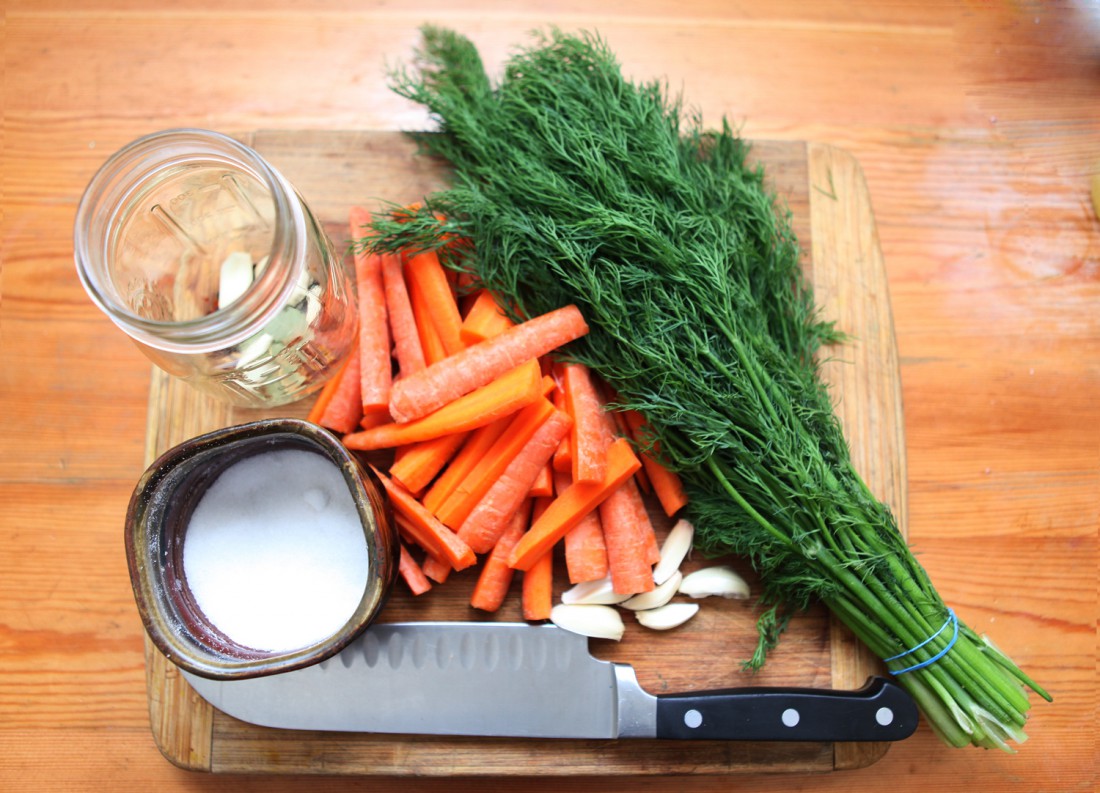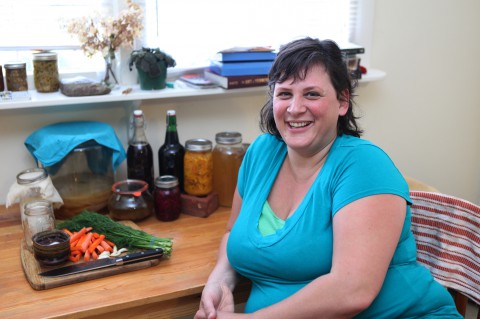The kitchen of Janelle Lucido-Conate’s West Asheville home is literally bubbling with life. Its shelves and countertops, decorated with a large and motley assortment of jars and crocks, reflect Lucido-Conate’s passion for cultured foods. Each vessel is packed with a different vegetable, dairy or sourdough ferment, and all are fizzing away contentedly as beneficial microbes go through various stages of the fermentation process.
As Lucido-Conate talks about what she’s brewing, she picks up the colorful jars — containing things like pickled brussels sprouts and elderberry kombucha — and offers aromatic samples. The love and care invested in these concoctions are obvious, and it’s clear that the cultures themselves play a role in her life that runs deeper than just what’s for dinner.
A recent transplant from the San Francisco Bay Area, Lucido-Conate considers it her mission to share — through local workshops she calls “kraut parties” and via her website — her knowledge and love of the art of fermentation.
“I want to help people who need that nudge, that boost of confidence, to take a leap,” she says. “I want to teach people to use what’s fresh, what’s in abundance: If you have a bunch of it, let’s ferment it and see if it tastes good. That’s what I’m all about.”
Lucido-Conate taught herself how to ferment about eight years ago after reading Sally Fallon’s landmark food-culture book Nourishing Traditions. Frustrated by a first stab at making sauerkraut, Lucido-Conate upended her $5 thrift-store crock but then realized that the stuff on the bottom wasn’t rotten. It had fermented and was amazingly tasty. Inspired, she kept experimenting and later honed her skills while making monthly large-scale ferments for up to eight families for a year as part of a food-swap cooperative.
She also discovered the work of self-described “fermentation revivalist” Sandor Katz (see “Revival Eating” elsewhere in this issue). “He gets fermentation in a way that’s very spiritual,” she says. And like him, she feels that cultured foods “are the food of the people. It belongs to all of us. It’s not just for foodies … or people who can afford to go out and buy raw, fermented foods at the store; it’s for all of us.”
Universal legacy
Ethnobotanist Marc Williams was also inspired by Katz’s ideas as well as by his friend and colleague, the late herbalist Frank Cook. Williams, who teaches fermentation and plant identification classes at A-B Tech, the Chestnut School of Herbal Medicine and numerous other local educational institutions, believes the recent resurgence of interest in fermenting is a natural reawakening for humanity.
“If you look at the food traditions of pretty much any indigenous culture all over the world, they’ve got some form of fermentation they were practicing,” he says. “So I do believe that it’s literally written into our DNA, and it’s the legacy of all of us, wherever we are from.”
Lucido-Conate aims to empower folks to start making their own cultured food so they can enjoy a healthy, tasty way of preserving the harvest while also moving closer to a deep-rooted cultural tradition. “This is one of the reasons I call my website Our Daily Kraut. We think of bread as a symbol of our culture … that our lives center around, but bread is essentially [made by] a fermentation process,” she explains.
“Basically, the yeast we use from a packet is made to mimic what we make with a sourdough starter. The truth is that it’s an industrialization of what already belongs to us. It’s our birthright. When people emigrate from one place to another, what they take with them is their seeds and their starter, whatever that starter is. … This is not just for rich people or poor people; this is of the people.”
Beneficial microbes
According to Williams, the rising popularity of fermented foods is also linked to a growing interest in probiotics and the revolutionary concept of the microbiome, the scientific term for the teeming communities of symbiotic, beneficial microorganisms that inhabit human bodies and are essential in supporting life functions.
“We’ve really pigeonholed microbes into being negative,” he explains. “Yet, just like with people, the vast majority of these microbes, especially the bacterial ones, are beneficial or neutral. It’s just the few bad actors, if you will, that give microbes a bad name.”
With probiotics, he says, it’s a multistep process. “Nature abhors a vacuum, so if we create open space, say with antibiotics, nature is going to fill it. So it’s our choice at that point: Do we want to fill it with whatever comes along … or do we choose to fill it with good microbes?” The process continues, he says, as the good microbes go on to add nutrients to food, break down anti-nutrients and facilitate digestion.
Lucido-Conate agrees. Getting up close and personal with the fermentation process, she says, can trigger “a whole paradigm shift. When we step into fermentation, all this fear [of bacteria] comes up, and it’s unexpected. When I started fermenting, it transformed how I looked at the world. It’s so empowering to have bacteria on your side instead of feeling like you’re up against a wall and somebody is attacking you.”
A matter of taste
But it’s not just urban homesteaders who are getting on the fermentation bandwagon. As more palates become attuned to the rich, lively flavors fermented foods can offer, local restaurants have gotten on board in a big way. Brendan Reusing of All Souls Pizza says it’s something many chefs in the area have been playing around with for quite some time.
“It tastes good; it makes you feel good,” he says. Plus it’s creative and simple. “It’s fun, and you can just play around with it.”
All Souls offers shots of beet kvass, a traditional Russian fermented beverage, as well as kimchi, sauerkraut and a ferment plate featuring a seasonally rotating variety of items such as puréed, fermented turnips; celeriac; and chilies served with fresh bread and olive oil. “We sell a ton of it,” says Reusing. His fire-roasted, red jalapeño chili sauce is particularly popular. (Sriracha fans, take note: This sauce could change your life. Seriously.)
Learning to ferment, notes Williams, can also give budding food entrepreneurs a viable cottage industry. Local fermented food and drink businesses such as Buchi kombucha and Smiling Hara Tempeh (never mind the region’s many craft breweries) have met with great success, and Williams thinks there are still plenty of unfilled niches, starting with products like kvass.
For fermentation recipes and details on Janelle Lucido-Conate’s kraut parties, visit ourdailykraut.com.
Marc Williams will offer a workshop titled “Fermented Foods for Entrepreneurs” at A-B Tech Wednesday, July 23, from 6-8:30 p.m. For details, visit bit.ly/abtech-classes or contact biobusinessclasses@ncbionetwork.org or 398-7943. To learn about Williams’ other class offerings, visit botanyeveryday.com.





Join Marc Williams at BioNetwork in July for some hands-on fermentation experience! https://www.facebook.com/events/231849017007718/